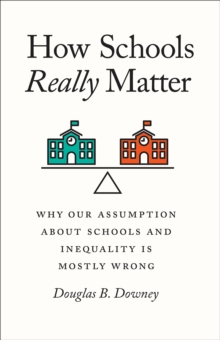Description
| Product ID: | 9780226733227 |
| Product Form: | Paperback / softback |
| Country of Manufacture: | US |
| Title: | How Schools Really Matter |
| Subtitle: | Why Our Assumption about Schools and Inequality Is Mostly Wrong |
| Authors: | Author: Douglas B Downey |
| Page Count: | 176 |
| Subjects: | Social mobility, Social mobility, Rural communities, Educational strategies and policy, Educational administration and organization, Rural communities, Educational strategies & policy, Organization & management of education |
| Description: | Select Guide Rating Most of us assume that public schools in America are unequal--that the quality of the education varies with the location of the school and that as a result, children learn more in the schools that serve mostly rich, white kids than in the schools serving mostly poor, black kids. But it turns out that this common assumption is misplaced. As Douglas B. Downey shows in How Schools Really Matter, achievement gaps have very little to do with what goes on in our schools. Not only do schools not exacerbate inequality in skills, they actually help to level the playing field. The real sources of achievement gaps are elsewhere. A close look at the testing data in seasonal patterns bears this out. It turns out that achievement gaps in reading skills between high- and low-income children are nearly entirely formed prior to kindergarten, and schools do more to reduce them than increase them. And when gaps do increase, they tend to do so during summers, not during school periods. So why do both liberal and conservative politicians strongly advocate for school reform, arguing that the poor quality of schools serving disadvantaged children is an important contributor to inequality? It's because discussing the broader social and economic reforms necessary for really reducing inequality has become too challenging and polarizing--it's just easier to talk about fixing schools. Of course, there are differences that schools can make, and Downey outlines the kinds of reforms that make sense given what we know about inequality outside of schools, including more school exposure, increased standardization, and better and fairer school and teacher measurements. How Schools Really Matter offers a firm rebuke to those who find nothing but fault in our schools, which are doing a much better than job than we give them credit for. It should also be a call to arms for educators and policymakers: the bottom line is that if we are serious about reducing inequality, we are going to have to fight some battles that are bigger than school reform--battles against the social inequality that is reflected within, rather than generated by--our public school system. |
| Imprint Name: | University of Chicago Press |
| Publisher Name: | The University of Chicago Press |
| Country of Publication: | GB |
| Publishing Date: | 2020-12-03 |


